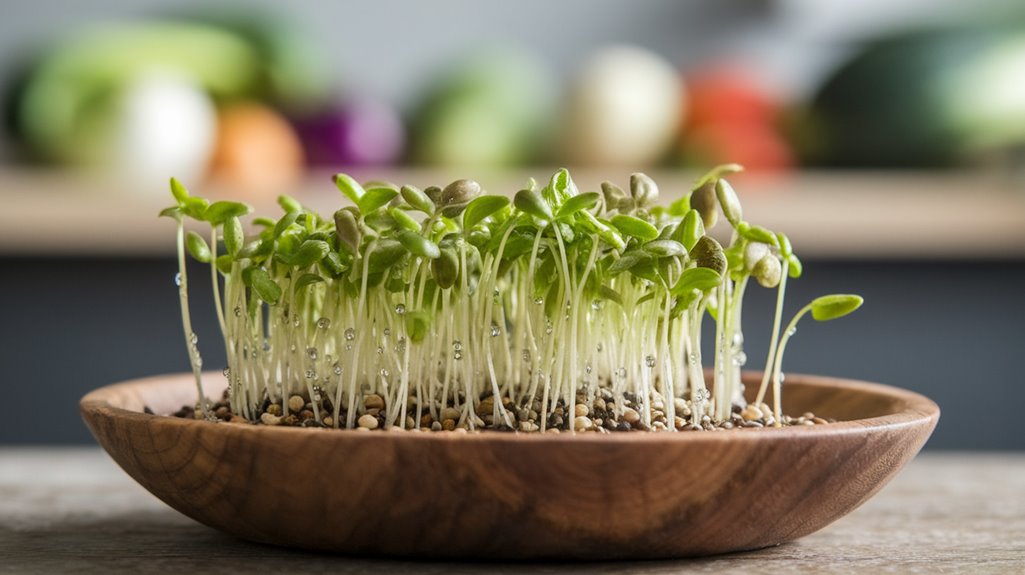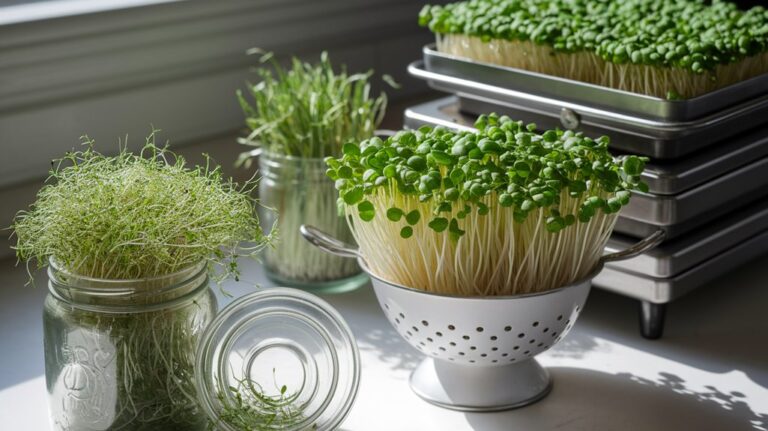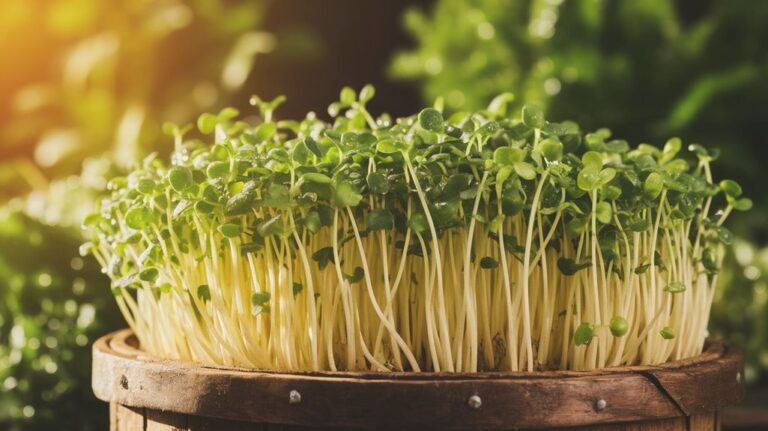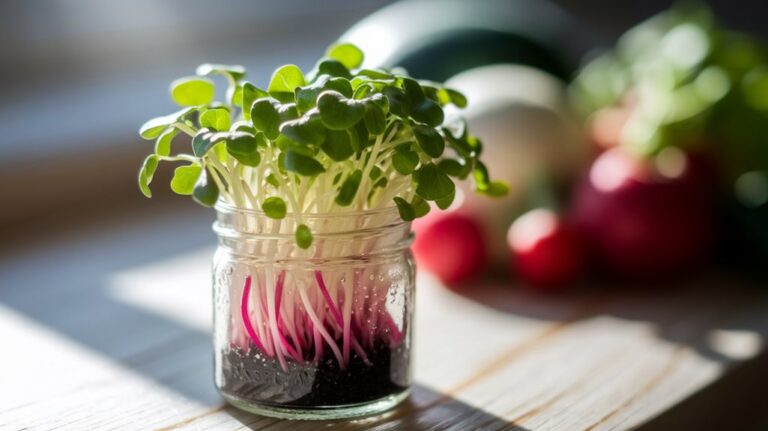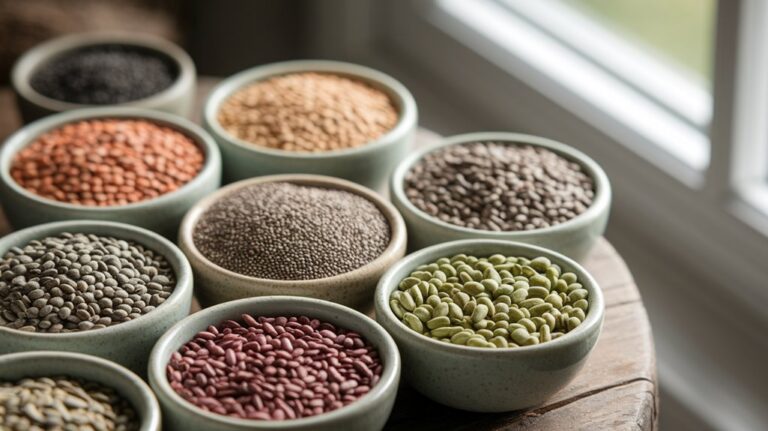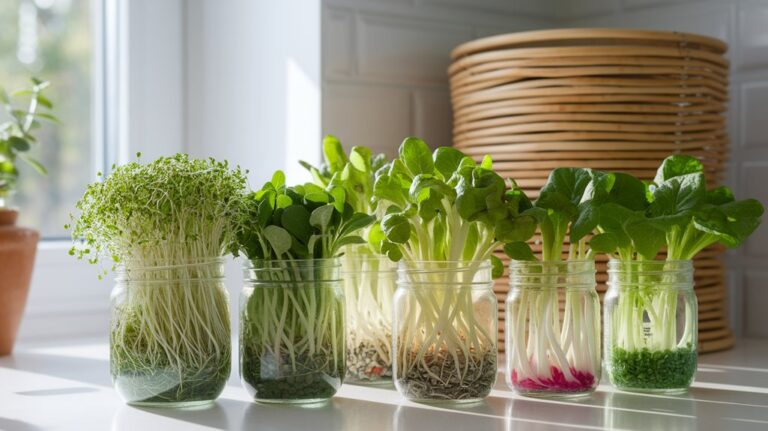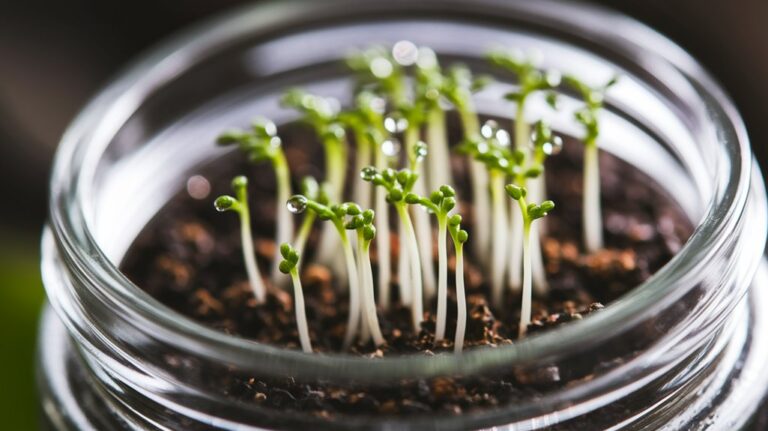Top 10 Reasons to Sprout Seeds and Their Benefits
Sprouting seeds transforms ordinary meals into nutritional powerhouses packed with vitamins, minerals, and antioxidants. I love how they boost digestibility by breaking down carbohydrates and proteins, making nutrients easier for my body to absorb. Plus, their crunchiness adds delightful texture to salads and sandwiches. Sprouting’s affordable and sustainable too, so I can grow them at home. If you want to uncover how sprouted seeds can enhance your health and cooking, let’s explore more exciting benefits together.
Key Takeaways
- Sprouted seeds enhance nutrient absorption, providing higher levels of vitamins and minerals essential for overall health and energy production.
- They improve digestibility by breaking down complex carbohydrates and proteins, aiding in better nutrient absorption and reducing bloating.
- Sprouts add a delightful crunch and vibrant flavors to meals, transforming simple dishes into gourmet experiences.
- Rich in vitamins A, C, and E, sprouted seeds support immune health and help fend off illnesses effectively.
- Growing sprouts at home is cost-effective, promotes sustainability, and encourages mindful eating practices by connecting you to your food sources.
Nutrient Density Boost
When I first discovered the benefits of sprouting seeds, I was amazed at how they could elevate nutrient density in my diet.
Sprouted seeds are packed with vitamins, minerals, and antioxidants, transforming a simple seed into a powerhouse of nutrition. For instance, sprouting increases vitamin C levels significantly, which is essential for immune health.
I also noticed a boost in B vitamins, crucial for energy production. Plus, the process enhances the bioavailability of nutrients, making them easier for my body to absorb.
Incorporating sprouted seeds into my salads or smoothies has become a game-changer. It’s a simple way to enrich my meals without a lot of effort.
If you’re looking to enhance your nutrient intake, I highly recommend giving sprouted seeds a try!
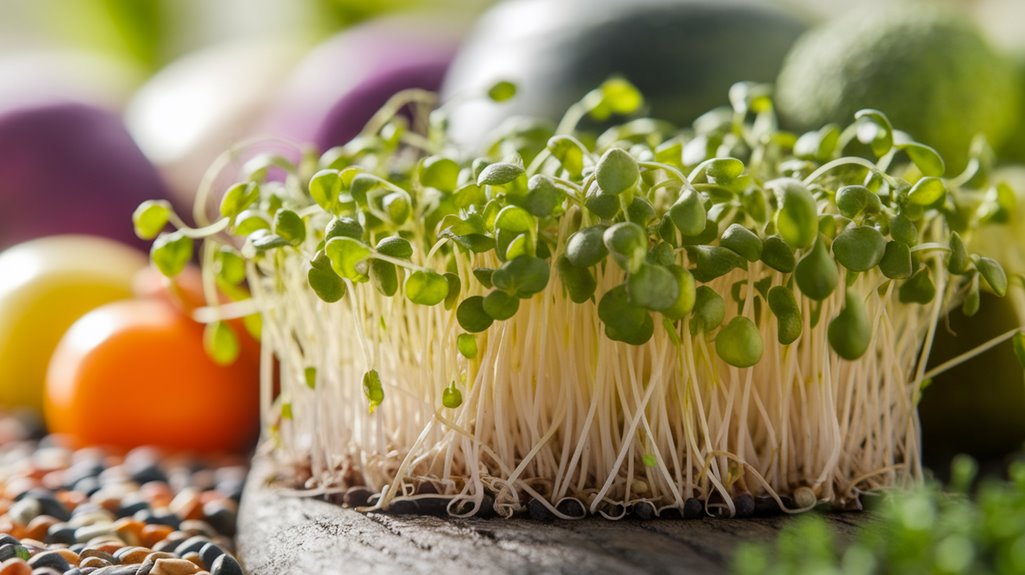
Enhanced Digestibility
Although I was already aware of the nutritional benefits of sprouting seeds, I was pleasantly surprised to discover how much they enhance digestibility. Sprouting breaks down complex carbohydrates and proteins, making them easier for our bodies to absorb. Additionally, it reduces antinutrients, which can hinder nutrient absorption. This means I can enjoy the full benefits of the vitamins and minerals sprouted seeds offer.
Here’s a quick comparison of digestibility in sprouted vs. unsprouted seeds:
|
Seed Type |
Digestibility (Sprouted) |
Digestibility (Unsprouted) |
|
Lentils |
High |
Moderate |
|
Chickpeas |
High |
Low |
|
Quinoa |
High |
Moderate |
|
Mung Beans |
Very High |
Low |
|
Sunflower Seeds |
High |
Low |
Incorporating sprouted seeds into my diet has truly been a game changer!
Improved Flavor and Texture
Not only do sprouted seeds pack a nutritional punch, but they also bring a delightful improvement in flavor and texture to my meals.
When I add sprouts to salads or sandwiches, the crunch provides a satisfying contrast to softer ingredients, enhancing the overall eating experience. Each bite bursts with freshness, often tasting sweeter and more vibrant than their unsprouted counterparts.
I love how they can elevate simple dishes, turning a basic salad into a gourmet delight. Plus, they’re incredibly versatile—whether I’m using alfalfa, broccoli, or lentil sprouts, each variety offers its unique flavor profile.
Incorporating sprouts into my cooking not only boosts the taste but also adds a fun texture that keeps me coming back for more.
Immune System Support
In addition to enhancing flavor and texture, sprouted seeds play a significant role in supporting my immune system.
These tiny powerhouses are packed with vitamins, minerals, and essential nutrients that help my body fend off illnesses. For example, sprouted seeds like alfalfa and broccoli are rich in vitamins A, C, and E, which boost immune function and promote overall health.
They also contain enzymes that aid digestion, allowing my body to absorb nutrients more effectively. Incorporating these sprouts into my meals, whether in salads or smoothies, provides a delicious way to strengthen my defenses.
Increased Antioxidant Content
While I enjoy the delicious crunch of sprouted seeds, I’m also amazed by their increased antioxidant content.
These tiny powerhouses pack a serious punch when it comes to fighting free radicals, which can damage our cells and lead to chronic diseases. Research shows that sprouting can significantly boost levels of antioxidants like vitamin C, flavonoids, and phenolic compounds.
This means that by incorporating sprouted seeds into my diet, I’m not just adding flavor and texture, but also enhancing my overall health. I love tossing them into salads, smoothies, or even onto sandwiches for that extra nutritional boost.
If you’re looking to amp up your antioxidant intake, sprouted seeds are a delicious and easy way to do just that!
Cost-Effective Nutrition
When I consider ways to eat healthily without breaking the bank, sprouted seeds stand out as an affordable option. They’re nutrient-dense, packing vitamins, minerals, and enzymes that often cost a lot in supplement form.
A small bag of seeds can yield a massive quantity of sprouts, meaning I get more nutrition for less money. Plus, sprouting seeds is a simple process that doesn’t require fancy equipment or extensive knowledge.
I can easily incorporate them into salads, sandwiches, or smoothies, enhancing my meals without spending a fortune. By choosing sprouted seeds, I’m not just saving money; I’m also investing in my health.
It’s a win-win situation that makes eating well surprisingly economical!
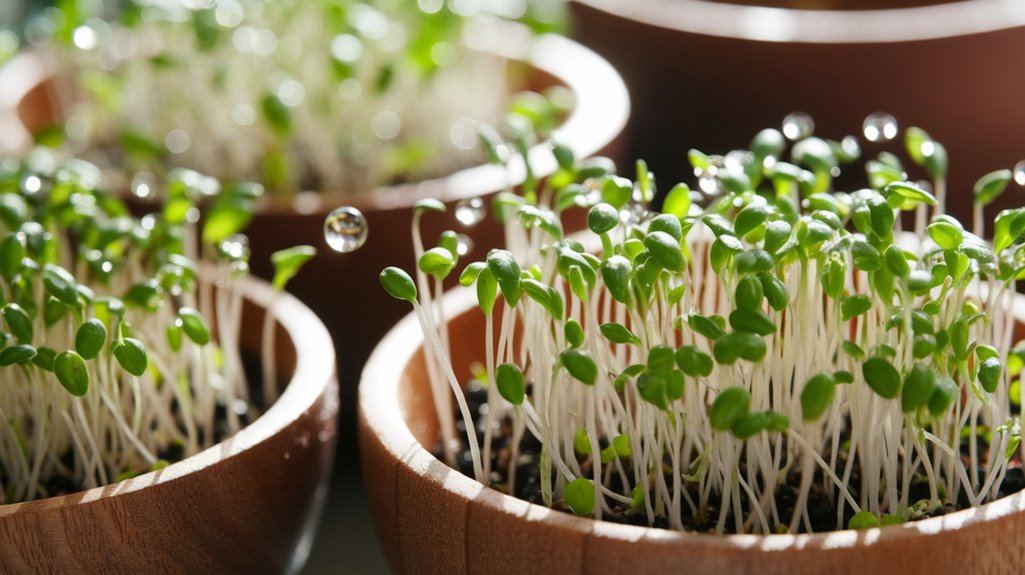
Easy to Grow at Home
Growing sprouts at home is easier than you might think!
You don’t need much space, and they can sprout in just a few days.
I’ll share how you can enjoy fresh, nutritious greens right from your kitchen countertop.
Minimal Space Required
If you’re looking for a simple way to incorporate fresh nutrition into your diet, sprouting seeds is a fantastic option that requires minimal space.
You don’t need a large garden or even a sunny windowsill. Just a small countertop or shelf will do!
Here are some reasons why sprouting seeds is perfect for tight spaces:
- They fit in jars or small trays.
- No expensive equipment needed; a mason jar works great!
- They grow indoors year-round, regardless of weather.
- You can easily move them around if needed.
- They add vibrant life to your kitchen.
With sprouting, you can enjoy fresh, nutritious greens without dedicating much space.
It’s an efficient way to elevate your meals right at home!
Quick Growth Cycle
One of the best things about sprouting seeds is their quick growth cycle, which makes them incredibly easy to grow at home. In just a few days, you can go from seed to delicious, nutrient-packed sprouts.
I’ve found that varieties like alfalfa and radish sprout in as little as three to five days! This rapid turnaround means I can enjoy fresh greens even during winter months when my outdoor garden is dormant.
Plus, you don’t need fancy equipment—just a jar, some water, and a little patience. It’s rewarding to watch them grow right on my kitchen counter, transforming my meals with vibrant flavors and added nutrition.
If you’re looking for an easy gardening project, sprouting seeds is a fantastic choice!
Versatile Culinary Uses
While exploring the culinary world, I’ve found that sprouting seeds bring a burst of flavor and nutrition to various dishes. Their versatility amazes me, as they can easily elevate meals in so many ways.
Here are some of my favorite uses:
- Toss them in salads for a crunchy texture.
- Blend them into smoothies for added nutrition.
- Use them as a garnish on soups or stews.
- Add them to wraps or sandwiches for extra flavor.
- Incorporate them into stir-fries for a delightful crunch.
These tiny powerhouses not only enhance the taste of my meals but also pack a nutritional punch.
I can’t help but feel excited about the countless possibilities sprouting seeds offer in my kitchen!
Sustainable Food Choice
Sprouting seeds aren’t just a tasty addition to my meals; they also represent a sustainable food choice that aligns with my values.
By choosing to sprout seeds, I’m reducing my carbon footprint and minimizing food waste. Unlike traditional farming, sprouting requires minimal resources like water and space, making it an eco-friendly option.
Plus, I can easily grow my own sprouts at home, ensuring freshness and cutting out the need for long-distance transportation. This practice not only promotes sustainability but also encourages me to be more mindful of my food sources.
Promotes Healthy Gut Microbiome
I love how sprouting seeds can really boost our gut health.
They enhance digestive health by introducing beneficial enzymes that help break down food, making it easier for our bodies to absorb nutrients.
With better nutrient absorption, we can feel more energized and nourished every day!
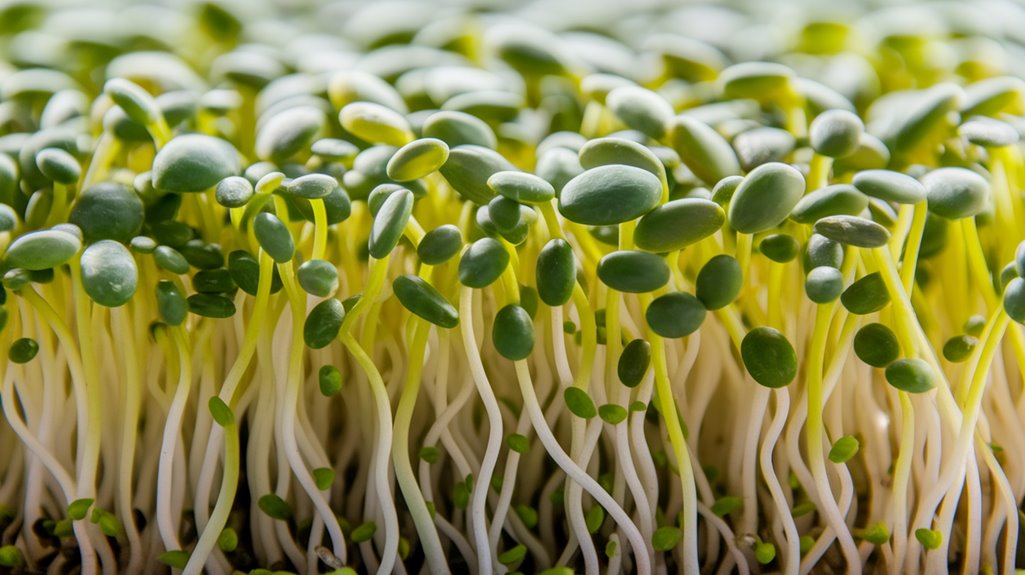
Enhances Digestive Health
When it comes to enhancing digestive health, sprouting seeds can play a crucial role in promoting a healthy gut microbiome.
I’ve experienced firsthand the benefits of incorporating these tiny powerhouses into my diet. They provide essential nutrients that support digestion and encourage beneficial bacteria growth.
Here’s why I love sprouting seeds for my gut health:
- They’re rich in probiotics that boost gut flora.
- Sprouts help reduce bloating and discomfort.
- They aid in breaking down food, making digestion easier.
- Sprouting increases enzyme activity, enhancing gut function.
- They offer a delightful crunch and flavor to meals!
Increases Nutrient Absorption
Although many foods can provide essential nutrients, the process of sprouting seeds significantly enhances their absorption in the body.
When I began sprouting seeds, I noticed my energy levels improved, and I felt more vibrant. Sprouted seeds contain enzymes that break down complex nutrients, making them easier for our bodies to absorb.
This process also increases the bioavailability of vitamins and minerals, which means I’m getting more bang for my buck when I eat them. Plus, the fiber in sprouted seeds supports a healthy gut microbiome, promoting digestion and nutrient uptake.
Incorporating sprouted seeds into my meals has become a go-to strategy for maximizing nutrient absorption, and I encourage you to try it too for better overall health!
Frequently Asked Questions
Conclusion
Incorporating sprouted seeds into your diet is a game-changer. Not only do they pack a powerful nutrient punch, but they also enhance flavor and promote gut health. Plus, growing them at home is easy and fun! With their versatility in the kitchen and sustainable benefits, it’s clear that sprouting seeds is a delicious way to boost your health and support the planet. So, why not give it a try and experience these benefits for yourself?

